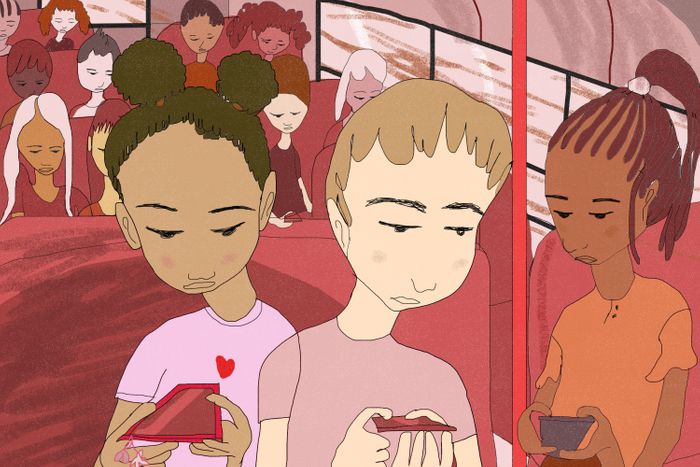
My older son started seventh grade last week, so yesterday I went out and bought a SIM card for my husband’s old iPhone SE. A big milestone has arrived: my son’s first phone.
As milestones go, this one is not my fave. I hate my phone, and I use it constantly. Unless my son turns out to be an unusual person, he will probably grow to do the same. Maybe this is fine — most people would insist that it is, that all of this is normal, that I need to relax. But I’m not relaxed. My phone has amplified my worst qualities and dulled my best ones. It has also done this to almost every other person I know. I realize that we rely on these things to exist in the world, but I refuse to believe that resistance is futile. Am I insane?
A few weeks ago, I began asking friends and acquaintances about when and why kids get their first phones. It all makes perfect sense when you lay it out flat: When kids are taking public transit alone to and from school, they need a way to stay in touch. When kids begin communicating independently, between each other, they need phones, otherwise a parent’s phone is constantly in use. My kid now qualifies on both counts.
Sometimes when we discuss parenting, the imperative to accommodate all perspectives can neuter the debate. When it comes to conversations about mobile devices, this imperative keeps us exactly where Tim Cook & Co. want us. Some children require smartphones at a young age; this is fine. When parents split up, there is often a need to chat with the kids directly when they’re with the other parent. In these cases phone use can start very young out of necessity. Respectfully, managing children’s travel between two separate households is a separate issue with its own distinct challenges. (For example, parents often differ wildly in the boundaries they set about device use.)
But another reason parents hate this topic and react defensively to provocations around it is that it touches on habits of our own that many of us can’t control. It’s interesting how much importance some parents of toddlers put on things like vegetable eating or wooden toys — things that, in both the short and long terms, make no difference to their kids’ development and are mostly to do with consumer choices and the development of “taste.” I’ve noticed that parents of little kids tend to have a slightly overdetermined view of their parenting methods. But once children get to be 11 or 12, these same parents might be unconcerned with smartphone use.
For the past year, my son has been one of the last of his friends without a phone. This has meant that my phone, whose number he has been giving out as his own, is blowing up more or less constantly, mostly with the incredibly inane shit that 11-year-olds text each other. I read it all. Within minutes of 3:30 p.m. most days, texts start coming in for him. Preteens have absolutely no phone manners, so if someone calls him and I don’t answer, they call again and again until they get bored and move on to something else.
At first this annoyed me, but now I’m used to it. To be honest, I have come to see it as part of my job as a parent. I’m the big dumb buffer between my son’s fresh, smooth brain and the sea of trash that wants to flood it. At home in the evening, I’ll sometimes pass him my phone and say, “So-and-so texted, he wants to see if you wanna meet up tomorrow.” Or, “Call back so-and-so, she FaceTimed 15 times this afternoon.” But sometimes I just don’t pass on the messages. None of them are urgent. Does this mean he might miss out on something? Maybe. I don’t care.
What I do care about is prolonging the time in my kids’ lives when they aren’t on standing reserve for their device. Sometimes the phone intersects with their day; sometimes it doesn’t. If days go by before a text is answered, no one should be upset. That is the reality that I, for a very short while longer, have the power to conjure.
Not for myself, though! I feel totally beholden to my fucking phone. I turn off notifications, I put it in another room while I work, but I live in a society in which we expect instant responses from each other, and I’m not trying to lose friends. I am trying to force myself to reply slower, inspired in part by some of my friends here in Montreal who are “terrible” at texting. Are they in fact … highly skilled at texting? Something to consider.
Ideally, my texts would be served to me twice a day, at set times, like the morning and evening newspapers of old. Urgent calls could still be made and received, but texts like, “What was that place you said was good, that you went to with Lindsay?” would wait. People would learn to expect a delay from each other. Our temporal realities would adjust accordingly. It would be fine.
This is the experience I’ve been able to maintain for my kids up until now, and for their sake I wish I could keep doing it. They don’t yet know the dull, nervous attentiveness that we all have for our devices. The sense that people are waiting to hear back, that we have important communicative work that needs to be done every waking hour of the day. As for the kids’ privacy, the sooner they learn that no digital trace they create is private, the better. I’m happy to help them internalize that lesson by reading every single text they send and receive. If they want to have a private exchange, they should learn to do it face-to-face.
When I was in high school in the mid-’90s, I shared an email address with my dad. In the evenings, he would print out any emails I had received that day (maybe one or two, from faraway friends) and slide them under my bedroom door with the discretion of a Victorian valet. At that time, the thought of creating my own email address seemed like a massive headache, so I just tolerated our sharing arrangement all the way until I graduated. It didn’t suck, to be honest. I did all the usual teenagerly bad stuff, just without emailing about it. In retrospect it was not a bad approach. I’m not saying I want to control access to my kids’ texts until they’re 18, but 14 — ninth grade? — seems like a reasonable idea.
Apple has begun marketing the Apple Watch as a “safer” way for children to have phone access. Have you ever had a conversation with a young person wearing an Apple Watch? They glance at their wrist with the exact same nervous assiduity I sometimes feel when I’m wearing a too-small shirt. Constant awareness, ongoing subconscious micro-adjustments. It’s a form of imprisonment, and Apple marketing it as something safe should be our first clue.
When I asked around about other families’ policies for device use, I learned a ton of tricks: Kids’ devices are kept in the parents’ bedrooms at night. Kids don’t have access to the Apple ID password, so they can’t download apps without permission. Parental-control apps. No data plan. Yes, some people give their children flip phones, which I profoundly respect, but I also know that some kids simply refuse to carry a flip phone (mine, for example). All of these are helpful, but none of them address my core discomfort: The phone resurfaces our perception and juices our expectations in ways we can’t control.
There is no official consensus about kids and smartphone use. The American Society for Pediatrics offers helpful questions to ask yourself before giving your kid their own phone, but very little advice about what to do once your kid actually has one. They recommend you make a “family media use plan,” which sounds to me like exactly the kind of thing no one does.
Everyone agrees that social media can harm teenagers’ self-esteem, but what about the constant presence of an always-on device? It’s not even social media in particular that concerns me — it’s the medium through which we engage with it. A wave of studies confirming a link between smartphone use and depression or anxiety among teens will be followed by studies claiming that maybe we’re overreacting, unless children are already at risk for other, unrelated problems, like anxiety or depression. Most researchers seem to agree that depression and anxiety are exacerbated by smartphone use, and that children who struggle with these issues are more likely to spend more time on their phones, causing a sort of negative feedback loop. But it’s not at all clear from the research that phone use is a high-risk activity among kids who are not predisposed to depression and anxiety.
Okay, but each day of our lives is a research site for this study, throughout which we gather our own data. What does your data tell you? Mine tells me that the things children need protection from change over time. My children have virtually no statistical reason to fear strangers they meet on the street. They do have reason to fear the cognitive neuroscientists who have consulted for Apple on the haptics of its devices. They have reason to fear the algorithms serving men’s-rights content to kids who enjoy watching Minecraft YouTubers.
The night after we gave our son his phone, he woke up from a nightmare at 2 a.m. and came into our room. I don’t remember the last time this happened — certainly it’s been more than five years. In the nightmare, he was being attacked by a massive swarm of millions of bees. He was afraid that if he fell back asleep, the bees would come back.
I felt for him. He had been handed a swarm the previous day. It will follow him everywhere now. He will learn to live with it, but it will never leave him.
More From This Series
- Is Annoyance the Most Romantic Emotion?
- Trad or Not, We’re All Nostalgic for a Fake Past
- Should Kids Really Learn About Getting Rich?


